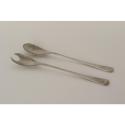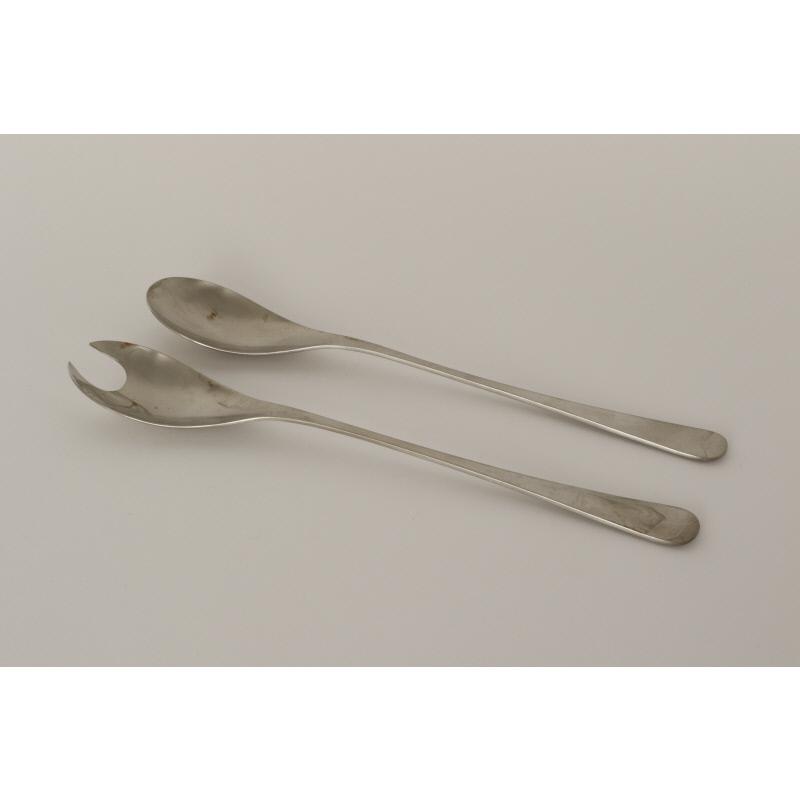Salad servers
Classification(s):
Metal
Date: c. 1951-1976
Organisation: Old Hall Ltd (British)
Dimensions:
280 × 45 mm (28 × 4.5 cm)
Medium: Stainless steel
Object number: M208N
See Also
Place of Production:England
DescriptionStainless steel salad servers by Old Hall. Manufactured in England. The Set comprises a serving fork and a serving spoon. The serving fork has rounded tines.
A product care leaflet “The Care of Stainless Steel Cutlery” produced by the United Kingdom Cutlery and Silverware Manufacturers Association and the Cutlery and Allied Trades Research Association is included.
Stamped to the reverse of each piece “Old Hall Stainless England”.
A product care leaflet “The Care of Stainless Steel Cutlery” produced by the United Kingdom Cutlery and Silverware Manufacturers Association and the Cutlery and Allied Trades Research Association is included.
Stamped to the reverse of each piece “Old Hall Stainless England”.
ProvenanceThis object was originally acquired for the Inner London Education Authority’s (ILEA) ‘Circulating Design Scheme’ collection.
The collection was instigated by the London Country Council (later the Greater London Council) and the Council of Industrial Design (COID). The collection’s original purpose was concerned with the teaching and dissemination of modern, ‘good design’.
The collection was established in 1951/52 as the ‘Experiment in Design Appreciation’, later renamed the ‘Circulating Design Scheme’.
The Circulating Design Scheme lent boxed showcases to London schools. The showcases contained handling objects, material samples and interpretation on a specific subject.
COID withdrew its involvement in the Scheme in 1957. After which time, it was managed exclusively by the London County Council from 1957-1963.
After the administrative restructuring of London authorities, the Scheme was jointly managed by the Greater London Council and the Inner London Education Authority (ILEA) from 1963 – 1976.
The Scheme was operational until 1976 when the collections were withdrawn from circulation. ILEA was abolished in the late 1980s and the collection was donated to Camberwell College of Arts in 1989/90.
ILEA was responsible for secondary and tertiary education in the inner London boroughs, this included Camberwell.
The collection was instigated by the London Country Council (later the Greater London Council) and the Council of Industrial Design (COID). The collection’s original purpose was concerned with the teaching and dissemination of modern, ‘good design’.
The collection was established in 1951/52 as the ‘Experiment in Design Appreciation’, later renamed the ‘Circulating Design Scheme’.
The Circulating Design Scheme lent boxed showcases to London schools. The showcases contained handling objects, material samples and interpretation on a specific subject.
COID withdrew its involvement in the Scheme in 1957. After which time, it was managed exclusively by the London County Council from 1957-1963.
After the administrative restructuring of London authorities, the Scheme was jointly managed by the Greater London Council and the Inner London Education Authority (ILEA) from 1963 – 1976.
The Scheme was operational until 1976 when the collections were withdrawn from circulation. ILEA was abolished in the late 1980s and the collection was donated to Camberwell College of Arts in 1989/90.
ILEA was responsible for secondary and tertiary education in the inner London boroughs, this included Camberwell.
NotesIn 1893, James Thomas Wiggin and his eldest son James Enoch set up a small manufacturing business, J & J Wiggin. In 1922 the company changed its name to ‘Old Hall Ltd’. With the development of stainless steel, the company began to manufacture tableware in the 1930s. Old Hall pioneered the use of stainless steel as a substitute for silver tableware, because it did not need regular polishing and did not tarnish. By the 1950s Old Hall was sold in over 2,000 stockists in the UK and began to dominate the market.









